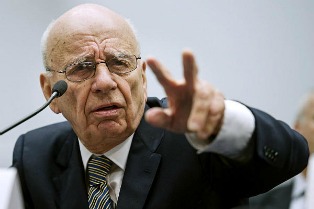
It’s not enjoyable to see established, profitable publishers shut-down, context notwithstanding. But I’m delighted that the baying crowd has given itself a yardstick by which to measure its own ethical performance. Let me qualify: it’s not the appalling details of the hacking scandals so much as the general extent to which News Corporation employees were prepared to put their reputations on the line, which merits such extended analysis. Those decisions, taken in order to stay ahead of their competition, are what have exposed the ethical cost of prioritizing cash revenue so defiantly.
Organizations like ProPublica and Spot.Us are leading the way for non-profit Journalism by putting their content first and developing communities around what they produce. But are there quality and impact benefits to feeling ‘coroporate’ as a publisher, that we’re in danger of leaving to algorithm-run social media sites and bloggers that mostly operate without any legally refined code of conduct?
Anyone who’s ever worked in an industry that sells recommendations or insight as a commodity, will know that the specter of ‘vested interests’ looms large over anyone’s credibility, particularly when conspiracy theorists are eager to join one dot (e.g. the New York Times‘ much-criticized editorial pandering to City industrialists) to another (Carlos Slim’s $250 million loan to keep them afloat).
Back when newspapers were the lifeblood of disseminating information, it was about news, which meant selling more copies, which meant having better news.
Not much has changed and if anything there’s more accountability now than then, as an internet population (provided they care) can spot flaws in a story within seconds of it ‘going live’. The case earlier this year of Johann Hari, the Independent journalist who admitted to plagiarism and internet-based fabrications that derided his peers and elevated his own reputation, was another pill to swallow for the UK’s Journalism industry. Hari’s career could have been shot, but it’s not, because he’s implicitly protected by the Independent, who are hiring him back after studying a Journalism course in NYC. The Independent, like News Corporation, can put themselves in the firing line because there’s an opportunity to be seized in being seen to promote the standards that they’re relied on to uphold for the rest of the industry.
The key concern here though, is whether ‘news’ consumers actually mind coverage that may be inaccurate, irrelevant or even plagiarized. Now that we’re so used to the immediacy of breaking news, many news organizations are happy to engage with corrections (often user-prompted) after-the-fact, rather than sacrifice their SEO advantage and let the new Drudge wannabe dominate the wires for a few extra, precious minutes before they ‘get on the scene’.
Americans who’ve been anywhere near a college that offers a Journalism or Mass Communication degree have a pretty strong sense of what ‘vested interests’ they should be wary of when producing or evaluating content. It’s also morally obvious to consumers that there may be less impartiality than one might wish for, when an article talking-up a new type of quartz crystal (designed by Rolex) sits 2-3 pages away from a full-page spread paid for by the same watchmaker. But do magazine consumers really care?
Perhaps it’s a print thing. If you can look a paper folio in the spine, then perhaps you’re comfortable perceiving its warts. Online, the tacky effect of in-context advertising can disintegrate whatever credibility you may be vaunting, before someone’s even made it to the end of your second headline. If it’s online, there can’t have been as much craft involved, which is a more vulnerable spot to be in, if you’re trying to deride claims that you’re offering ‘cheap’ product.
The more seriously a publisher is seen to be taking themselves, the more they’re prepared to be held accountable and occasionally, as with News Corporation, the more likely it becomes that institutions get toppled by ethical considerations that don’t restrict the droves of self-publishing soap-boxers that have no professional training whatsoever. There’s no room for sentiment here and so it must be, if self-regulation is going to prove reliable enough to help prevent stricter legislation from driving us back to the dark ages.